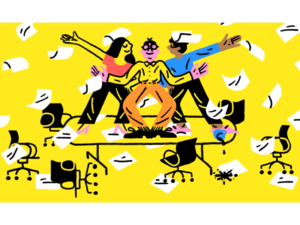Even the thought of this was like a dream for employees until many companies switched to working from home with the pandemic. Who doesn’t love the idea of stopping the commute and being home? However, those who have been working from home for years know that this is not as easy as it seems. This is a much more stressful situation than anticipated.
Juliet Funt , CEO of Whitespace at Work, says that issues like team productivity, training, loneliness, isolation, distractions are real and these are challenges that need to be overcome.
“One of the most critical challenges is the feeling that the work is never done.” says. “The person wakes up, picks up the laptop from the bedside table, and begins an alternating cycle of 10 to 14 hours. It enters a complex cycle of parts from laptop to children, laptop to laptop, food to laptop, cleaning to laptop, and more.”
“This program is not sustainable and can be a big problem for your productivity. But the reality is that many of its challenges are not location-specific, preventing an easy and logical workflow,” Funt said. says.
So “Productivity is portable.” says. “Teams that developed simple, clear communication and logical workflow skills brought those skills and filters home.”
So what should we do in order not to lose productivity while working from home?
1) Keep the same atmosphere.

If you need to use more than one workspace in your home, create the same environment every day with things like a paper, photo or pen holder everywhere. Funt tells you that repeating the setup will “open” your brain to work, and returning to the same planned workspace over and over will visually give you a sense of power.
Use a notepad or a piece of paper. Using paper that is mentally uncomplicated and easy to interact with helps you think more clearly, distracting you from the noisy chorus of tech-based checklists. Having the paper with you is like having your kind boss. He gently and repeatedly invites you to use your time right for the most important thing.
2) Get rid of low value activities.

Take what Funt calls “garbage work” that fills the day, such as routine paperwork. These low-value activities can be a barrier to achieving important and meaningful aspects of your business.
“What most companies do: deal with tactics and strategy and forget about the behavioral,” Funt said. He adds: “They are doing restructuring thinking that putting people in new seats will change the way they work. They’re making technological improvements and doing classical process improvement work.”
Instead, have a reductionist mindset where it makes sense to get rid of unnecessary things. “Developing a reductionist mindset means you have adopted a habit or a reflex. Eliminate or cut out the unnecessary. ”says Funt.
3) Add the white range.

Taking breaks during the day is popular advice, but we can get confused about when and how long to take a break. For example, The Energy Project tells you to follow your body’s circadian rhythm and take a break every 90 minutes, while the Pomodoro Technique recommends taking a break every 21 minutes. “Scheduled breaks don’t always fit your job,” says Funt. Try a more intuitive model. Determine your break time by paying attention to your individual inner cues.
Take a break when you feel suffocated from phone calls and texts, your body tingles from high adrenaline, or your body signals to rest. Funt calls it a strategic pause.
4) Determine the e-mail times.

Your email inbox can disrupt your productivity if you let it. Funt says you should open your email gateway whenever you decide, rather than keeping it open all day. “You can check, for example, every hour or every 2 hours,” he says.
5) Establish a rush hour ritual.

Efficiency may depend on segmentation, a vital habit of work-from-home professionals. “Every time you can put something in a box it helps you focus,” says Funt.
You can visually end your day by opening a ready-made compartment such as a drawer or cupboard and placing all your work-related items in it. This concept will allow you to transition more easily when your work is done. Put them in and get out. “It’s not easy to exit a virtual world where we can always be available and sometimes we feel we should be,” Funt said. says.
Another technique of breaking ties with work for the evening is to announce it, what Funt calls “a verbal pseudo-trapping.”
“When you want the job done, stand in front of your friends, kids or loved ones, or a roommate and say, “I finished work today.’ “If you live alone, you can call or text a friend and say the same thing. Or just say it for your own ears to hear.”
Funt says working from home is both good and bad, and people who do it successfully use a constant balance of gratitude and acceptance for the pros and cons. “They celebrate autonomy and freedom.” says. “And they accept social limitations as they should be.”














